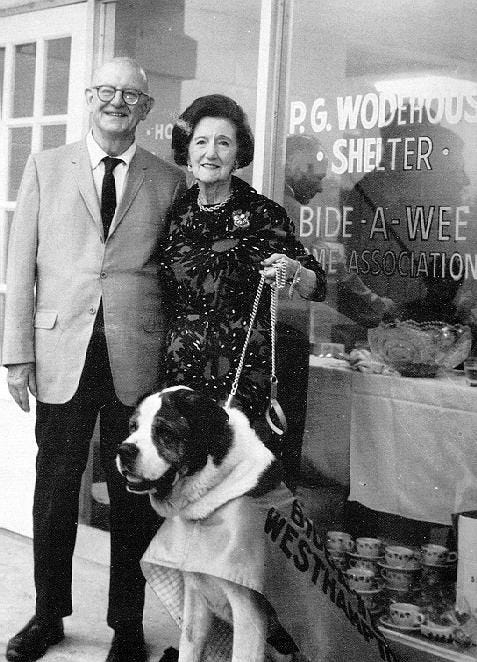P.G. Wodehouse & the Nazis
Banned from Libraries and the BBC; Defended by George Orwell
P.G. Wodehouse (1881-1975) was an English-born comic novelist, short-story writer, lyricist, and playwright, best known as the creator of Jeeves, the supreme “gentleman’s gentleman.” He wrote more than 90 books and more than 20 film scripts and collaborated on more than 30 plays and musical comedies.1
Wodehouse is widely regarded as the greatest comic author of the 20th century. The PG Wodehouse Society has over 1,000 members and publishes a quarterly journal.2
Broadcasts on German Radio : How to be an Internee Without Previous Training
Wodehouse moved to France after 1934 (because of taxes) and was detained by Germans in 1940 where he was imprisoned in various camps.3 He was released from internment a few months before his sixtieth birthday—the age at which civilian internees were released by the Nazis.
Wodehouse was "cleverly trapped" into making five broadcasts to the US via German radio, with the Berlin-based correspondent of the Columbia Broadcasting System. The broadcasts—aired on 28 June, 9, 23 and 30 July and 6 August in 1941—were titled How to be an Internee Without Previous Training and comprised humorous anecdotes about Wodehouse's experiences as a prisoner, including some gentle mocking of his captors.4
You can read the Broadcasts: PG Wodehouse Berlin Broadcasts - They are pretty silly.5
One drawback to being an internee is that, when you move from spot to spot, you have to do it in company with eight hundred other men. This precludes anything in the nature of travel de luxe
There is also another inner camp official whom I forgot to mention - the Sonderführer. I suppose the best way to describe him is to say that he is a Führer who sonders.
However, Wodehouse’s use of enemy broadcasting facilities evoked deep and lasting resentment in Britain.
George Orwell’s “In Defence of P. G. Wodehouse.”
“Within twenty-four hours of listening to the broadcast of Cassandra, the Daily Mirror columnist, Portadown (North Ireland) Urban District Council banned P. G. Wodehouse's books from their public library.6 In addition the B.B.C. banned Wodehouse's lyrics from the air and was still doing so a couple of years later. As late as December 1944 there were demands in Parliament that Wodehouse should be put on trial as a traitor.
Why should a few rather silly but harmless remarks by an elderly novelist have provoked such an outcry? One has to look for the probable answer amid the dirty requirements of propaganda warfare.7
There is one point about the Wodehouse broadcasts that is almost certainly significant — the date. Wodehouse was released two or three days before the invasion of the U.S.S.R., and at a time when the higher ranks of the Nazi party must have known that the invasion was imminent. It was vitally necessary to keep America out of the war as long as possible, and in fact, about this time, the German attitude towards the U.S.A. did become more conciliatory than it had been before. The Germans could hardly hope to defeat Russia, Britain and the U.S.A. in combination, but if they could polish off Russia quickly — and presumably they expected to do so — the Americans might never intervene. The release of Wodehouse was only a minor move, but it was not a bad sop to throw to the American isolationists. He was well known in the United States, and he was — or so the Germans calculated — popular with the Anglophobe public as a caricaturist who made fun of the silly-ass Englishman with his spats and his monocle.8
The broadcasts Wodehouse made were innocuous and did not reveal any sympathy for the Nazi cause even though the Nazi's tried to make it seem as if he supported Germany. An investigation by the authorities after the war found Wodehouse to be innocent.9
Never Returned to England
Wodehouse and his wife eventually went to the United States in 1946 where he continued to write, became a U.S. Citizen in 1955, opened an animal shelter in New York, and never returned to England.
Sir Pelham Grenville Wodehouse, KBE
In 1975 Wodehouse was knighted. He died a month later.
In 2019 a Memorial stone to P G Wodehouse was dedicated at Westminster Abbey.10
Connolly, Joseph (1987) [1979]. P.G. Wodehouse. London: Thames and Hudson.
Phelps, Barry (1992). P.G. Wodehouse: Man and Myth. London: Constable.
PG Wodehouse Berlin Broadcasts - Wartime Radio (pgwodehousebooks.com)
WODEHOUSE BOOKS BANNED; 90 Volumes in Public Library in England Destroyed. Special Cable to THE NEW YORK TIMES. Aug. 6, 1941.
George Orwell, “In Defence of P. G. Wodehouse.”
First published: Windmill. — GB, London. — July 1946; Reprinted:— ‘Critical Essays’. — 1946;— ‘The Orwell Reader, Fiction, Essays, and Reportage’ — 1956; ‘Collected Essays’. — 1961.— ‘The Collected Essays, Journalism and Letters of George Orwell’. — 1968.
Ibid.
Sproat, Iain. “In All Innocence: The Truth About P.G. Woodhouse and the Nazis.” TLS. Times Literary Supplement (1969), no. 5039 (1999): 14–.
“Chaplin and Wodehouse are knighted: In queen's honors list Chaplin and Wodehouse knighted by queen. New York Times (1923-). Jan 02, 1975:69.





I have always thought that Wodehouse was treated so unfairly. He was not at all like Ezra Pound, for example. He did what he had to to survive and even keep his chin up, and was condemned as a traitor by those who were safe and comfortable at home.
I didn’t know that Orwell defended Wodehouse--yet another reason to admire him!
I don't know whether it' s the odd mood I'm in or the late hour but reading those five broadcast transcripts - and far removed from the terror, fear and horror of the war - I'm left with a deep respect for Wodehouse and the spirit with which he confronted the sadness and deprivation of that year. His closing remark ("...before concluding I should like once
more to thank all the kind people in America who wrote me letters while I was in
camp. Nobody who has not been in a prison camp can realize what letters,
especially letters like those I received, mean to an internee.') touched me. I have read none of the man's novels. I may never. But I will never again think of him as a "mere" humorist. The man's humility and decency resonate back to us across the years. Thank you for showing us this.